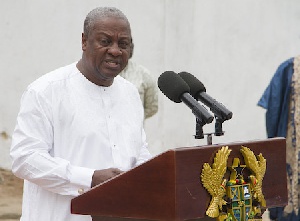President John Dramani Mahama has stated that Ghana’s average water access tops 76 per cent “with good drinking water both rural and urban”.
He noted that the coverage in the capital city has even been overtaken, reducing drastically the carrying of yellow jericans in search of water by many residents.
“The struggle with yellow jericans and numerous polytanks have been made redundant or drastically reduced in many communities,” President Mahama said as he commissioned the first ever desalination plant on Friday, April 17.
The plant is expected to produce 13 million gallons of water daily to consumers in Teshie Nungua and its environs.
“With this achievement, we have caught up with Accra’s water demand and indeed we have overtaken Accra’s average water demand,” President Mahama said, adding that communities such as Kpong, Kyebi, Essakyir and Mampong have already had expanded water-producing facilities.
The project converts saline sea water into drinkable, potable form. It was completed by Befesa Desalination Ghana at $115 million.
Paramount Chief of Nungua Odaifio Welentse III attested to the purity of the water.
“I must say here and now that the water is very pure without any salt or infection when taken. The members of the Nungua Traditional Council have tasted it prior to this commissioning.”
He congratulated President Mahama and his government for setting up the project – the first of its kind in the subregion – in Nungua.
The desalination project was embarked upon under a Public-Private partnership (PPP) initiative.
Minister of Water Resources, Works and Housing Dr Kweku Agyemang Mensah said the project is evident of the results good PPPs can offer.
“This achievement should spur us on to undertake more of such projects where the government provides the needed leadership and congenial atmosphere that enable the private sector participate in water delivery and other infrastructural projects in the country.”
General News of Saturday, 18 April 2015
Source: tv3network.com
Mahama: ‘Kufuor gallons’ made redundant; there is good drinking water
Entertainment












